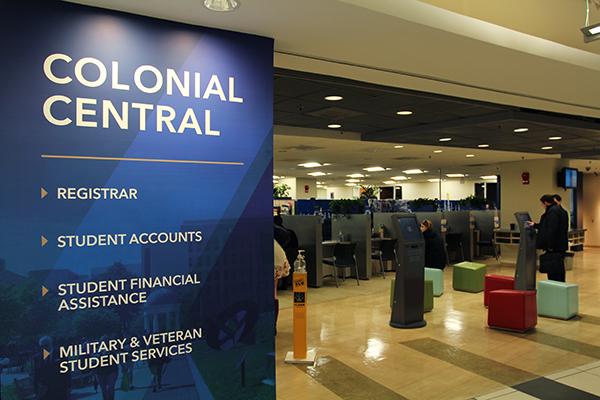Student veterans could soon have their own center to seek military advising and counseling.
The Veterans Resource Center Initiative, an effort launched by GW Veterans, has been meeting with GW officials to find veterans a place for students to access services like counseling, but also a space to socialize and study — resources the students say they currently lack on campus. They plan to gain University President Steven Knapp’s approval and are seeking a $10,000 grant to fund the project.
The center would build on existing resources for veterans on campus like counseling services and scholarship programs. GW created a position in Mental Health Services in 2013 to specifically work with veterans, and officials also created an administrative position in the past to specifically focus on veteran students.
Victoria Pridemore, the associate director of military and veteran student services, said that her department is working with the students and wants to help expand its resources on campus.
“The VALOR Student Services has had discussions with the GW Veterans student group about the proposed Veterans Resource Center,” she said. “We are supportive of this endeavor and continue to explore ways in which we can enhance resources and offerings that support GW’s student veteran population.”
Because veterans get their tuition costs covered through the federal government, they are a highly desirable group of students for schools to attract. More than 50 universities like the University of Maryland, College Park already have military resource centers.
GW Veterans President Yannick Baptiste said that while GW is well-known for its academic programs for veterans, social programming for the group of students isn’t as well-covered.
The Office of Military and Veterans Student Services currently manages veteran and military student engagement, but Baptiste said it has a maximum capacity of about eight people in its existing Marvin Center office. This prevents the office from being a more welcoming community for the veteran and military student population, he said.
“There’s a number of schools that have seen what having a centralized community can do, especially for this non-traditional populous, and it’s one of those things that, right now, GW still lacks,” Baptiste said.
Student groups like ROTC, the GW Society of American Military Engineers and the GW Military Law Society could potentially be located in this resource center. The center would have amenities including conference rooms for studying and advising, community computers, a kitchenette and lockers for students who live off campus.
Baptiste said he’s been meeting with staff in the Division of Operations, but they have yet to determine a location for the resource center.
Baptiste, who took over as GW Veterans president in May, said he came up with the idea of the Military Resource Center Initiative when he noticed that the Student Veterans of America had launched a Vet Center Initiative. Schools like Fordham and James Madison universities have received loans of up to $10,000 from Home Depot to build military resource centers.
“One of the things that GW’s still kind of lacking is really engaging the community in an ongoing fashion,” Baptiste said. “What we want to do is create a space especially for that demographic that would welcome them to come year-round. Not just at one a semester, but for them to remain engaged, so that they can really acquire all the different resources that GW has to offer.”
Officials also gave students recovering from mental illness and substance abuse a space on campus to access resources, one of the most recent examples of GW creating a space on campus for a specific group of students.
Over the upcoming weeks, Baptiste said he’s meeting with Alicia Knight, the senior associate vice president of operations, to work out the process of getting a space carved out on campus. They also hope to receive an official letter of support from Knapp by the end of the semester, which is a requirement for the Student Veterans of America grant.
Baptiste said GW Veterans will start fundraising by reaching out to prominent alumni with a history of support for the military, like former Secretary of State Colin Powell and Rep. Tammy Duckworth, D-Ill. The students also plan on reaching out to large companies like Booz Allen Hamilton, Northrop Grumman, JPMorgan Chase and Boeing, which have a history of support for GW Veterans, and are also prospective sources of donations and corporate mentorships for students in the future.
“The more people that want to get involved with this, the more likely it is to happen. We’re also really hoping to build stronger ties with GW, with the community as a whole, while also still promoting a military awareness as well,” Baptiste said.







